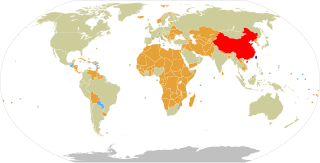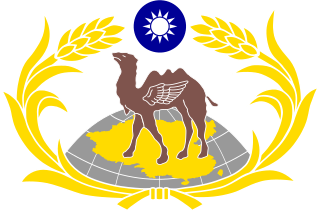
The economy of Taiwan is a highly developed market economy. It is the 8th largest in Asia and 18th-largest in the world by purchasing power parity, allowing Taiwan to be included in the advanced economies group by the International Monetary Fund. It is gauged in the high-income economies group by the World Bank. Taiwan is one of the most technologically advanced computer microchip maker in the world.

The Republic of China (ROC), commonly known as Taiwan, has full diplomatic relations with 13 of the 193 United Nations member states and with the Holy See. In addition to these relations, the ROC also maintains unofficial relations with 58 UN member states, one self-declared state (Somaliland), three territories, and the European Union via its representative offices and consulates under the One China principle. Taiwan has the 31st largest diplomatic network in the world with 110 offices.

Hsinchu is a city, of the Republic of China (Taiwan) and most populous city in Taiwan Province not among the special municipalities, with estimated 450,655 inhabitants. Located in northwestern Taiwan, Hsinchu is a coastal city bordering the Taiwan Strait to the west, Hsinchu County to the north and east, and Miaoli County to the south. Nicknamed the Windy City for its strong northeastern monsoon during the autumn and winter seasons.

Chiayi County is a county in southwestern Taiwan surrounding but not including Chiayi City. It is the sixth largest county in Taiwan.
The National Center for High-Performance Computing is one of ten national-level research laboratories under National Applied Research Laboratories (NARL), headquartered at Hsinchu Science and Industrial Park, Hsinchu City, Taiwan. The NCHC is Taiwan's primary facility for high performance computing (HPC) resources including large-scale computational science and engineering, cluster and grid computing, middleware development, visualization and virtual reality, data storage, networking, and HPC-related training. The NCHC is also responsible for the operation of the 20 Gbit/s Taiwan Advanced Research and Education Network (TWAREN), the national education and research network of Taiwan. The NCHC supports local academia and industry with hardware and software, advanced research and application development, and professional training.

The Taiwan External Trade Development Council is a non-profit government co-sponsored trade promotion organization in Taiwan.

Gushan District (Chinese: 鼓山區; pinyin: Gǔshān Qū; Wade–Giles: Ku3-shan1 Ch'ü1) is district of Kaohsiung City, Taiwan.
The National Economic and Technological Development Zones are the special areas of the People's Republic of China where foreign direct investment is encouraged. They are usually called the "Economic and Technological Development Zones" or simply the "Development Zones".
Barry Lam is a Taiwanese billionaire businessman, and the founder and chairman of Quanta Computer. He is also a patron of the arts and a philanthropist in the area of culture and education.

National Dong Hwa University is a national research university located in Hualien, Taiwan. Established in 1994, NDHU is widely considered as a high potential research university and the most prestigious university in Eastern Taiwan by Liberty Times, THE, QS, US News. NDHU offers sixth widest range of disciplines in Taiwan, including the sciences, engineering, computer science, environmental studies, oceanography, law, arts, design, humanities, social sciences, education sciences, music, and business.

Wu Ming-ji or Wu Ming-chi is a Taiwanese politician. He was the Deputy Minister of the Council for Economic Planning and Development (CEPD) of the Executive Yuan in 2012–2013.
The North American Taiwan Studies Association (NATSA) is an American 501(c)(3) nonprofit academic organization established in 1994. It is operated by overseas Taiwanese students, North American doctoral students, and recent graduates who are interested in Taiwan studies. The NATSA annual conferences are the largest academic events on Taiwan Studies in North America. The NATSA conferences not only provide scholars and students of Taiwan Studies a regular forum to meet and exchange intellectual ideas, but also allow researchers on East Asia and beyond to receive dynamic feedback and broaden their academic horizons.

Recording Industry Foundation in Taiwan, also known as IFPI Taiwan, formerly IFPI Members Foundation in Taiwan, is the organization that represents the interests of the music industry in Taiwan, and a member of the International Federation of the Phonographic Industry (IFPI).

The National Development Council is the policy-planning agency of the Executive Yuan of the Republic of China.

The Armaments Bureau is the affiliated authority of the Ministry of National Defense of the Republic of China.

The Industrial Development Bureau, MOEA is the administrative agency of the Ministry of Economic Affairs of Republic of China. The economy of Taiwan has achieved Industrialized Economy (IE) status as defined by UNIDO, and Taiwan is included in the UNIDO's Competitive Industrial Performance Index (CIP) and ranked 8th overall in UNIDO's Industrial Development Report among global economies in 2022.

Chao Shou-po is a Taiwanese politician, educator, civic activist and lawyer who has served as Governor of Taiwan Province and Commissioner of the Chinese Professional Baseball League. He is also a prominent leader in the World Scout Movement.
The Institute for National Defense and Security Research (INDSR) is a Taiwanese think tank based in Taipei. The Institute’s mission is to safeguard Taiwan's democracy and prosperity by strengthening mutual understanding and advancing common interests in the global and Taiwanese defense and security community. The institute is operated under the auspices of the government and the Legislative Yuan and has a NT$125 million annual budget.

The defense industry of Taiwan is a strategically important sector and a significant employer. They primarily supply weapons and platforms to the Republic of China Armed Forces with few major weapons systems exported abroad. With foreign assistance the Taiwanese defense industry has produced fighter aircraft, missile systems, surface ships, radars, rocket artillery, armored vehicles, and small arms.